From Larini to Clark: Motor Sport's top 20 touring car drivers
We asked a jury to separate the saloon greats from the grating metal. Paul Fearnley, Richard Heseltine and Damien Smith assess the verdict...
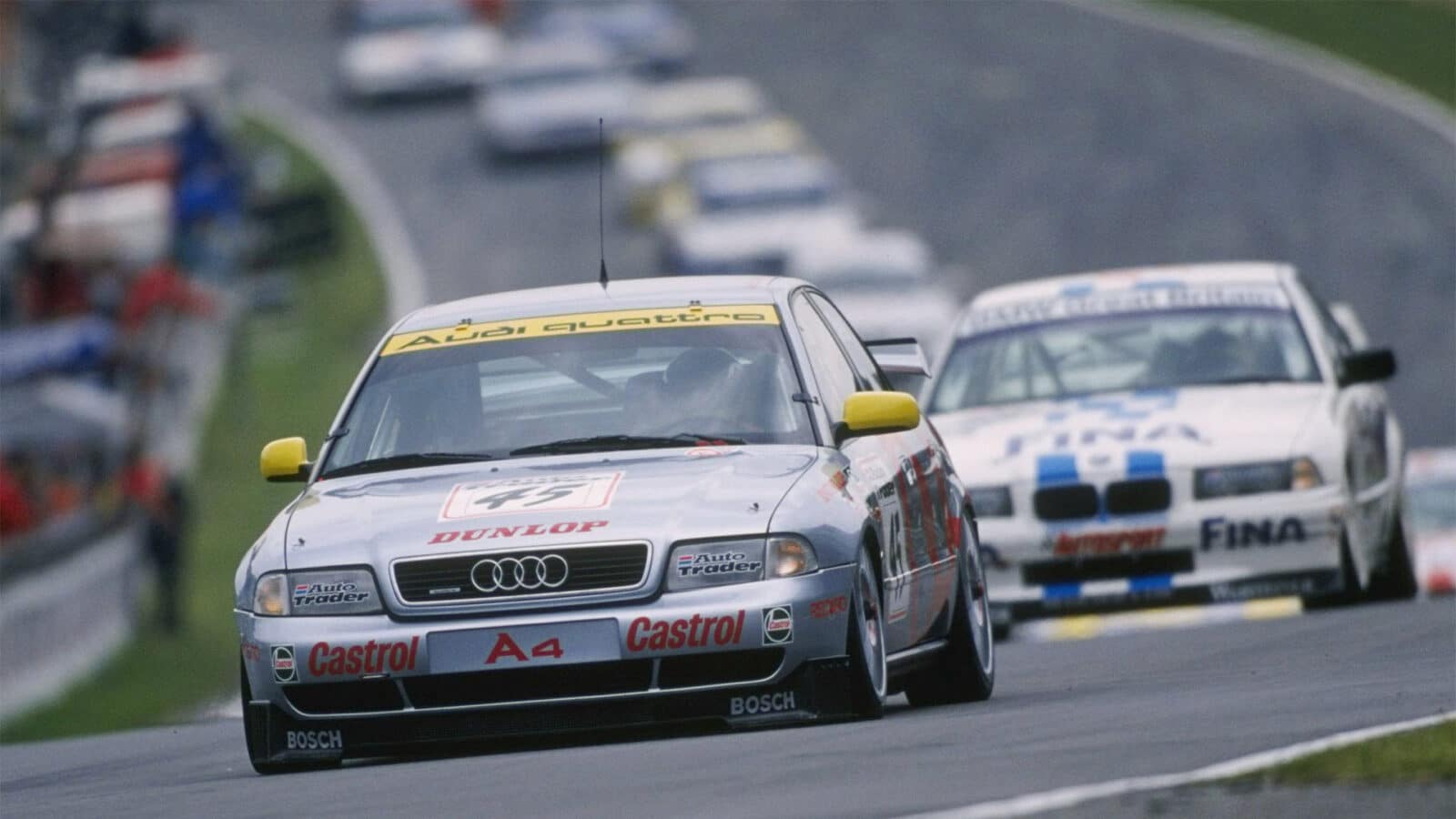
Who tops Motor Sport's list of tin-top aces?
Allsport/Getty Images
20. Nicola Larini
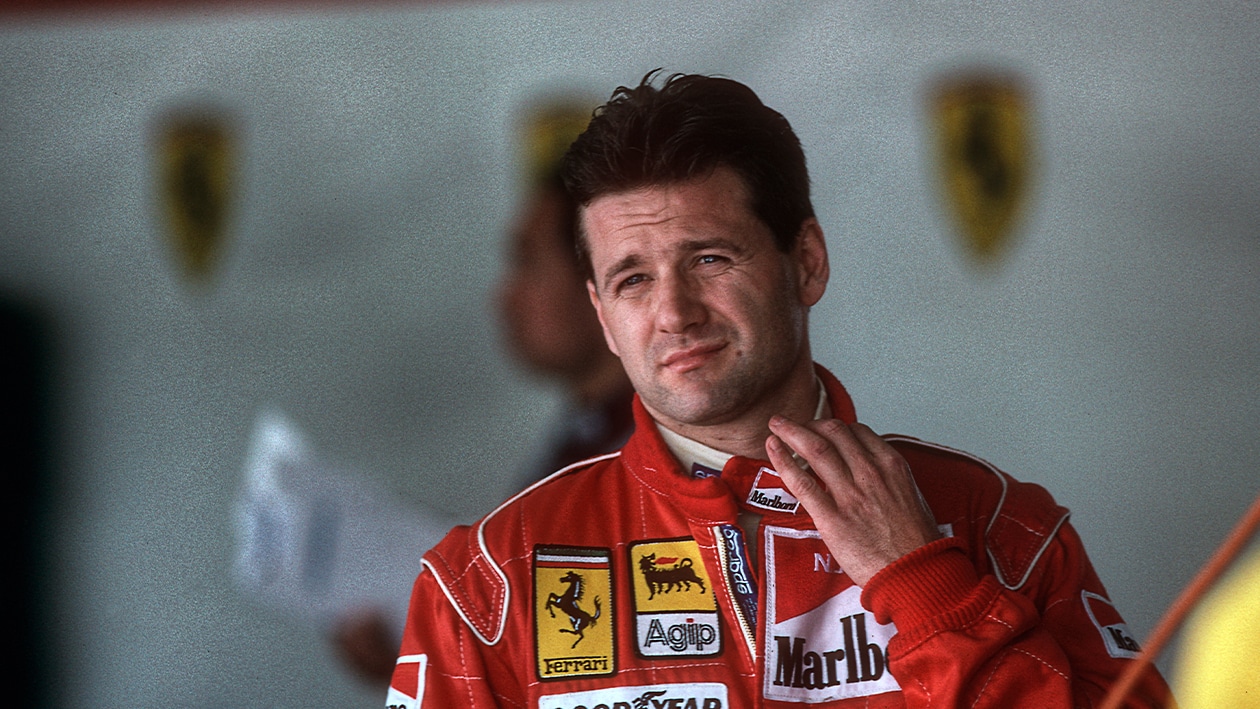
Larini showed his pace as Ferrari’s stand-in driver, but was never given the full-time race seat
Paul-Henri Cahier/Getty Images
The Italian’s performance in the 1993 German Touring Car Championship (aka Deutsche Tourenwagen Meisterschaft, DTM ) was stupefying. As the series entered its hi-tech phase he grabbed a 4WD Alfa 155 by its centre diff and hurled it to 11 wins, 12 fastest laps (from 22 starts) and a dominant title. Larini was hot property (in saloons at least) having won Italy’s Superturismo (Super T) title in ’92 with nine wins in Alfa’s fwd 2-litre (Class 2) version of the 155.
Another driver chasing a distant F1 dream during the late 1980s, Larini kept his pecker up with visits to his national saloon series, scoring 12 wins in the rwd (he was adaptable!) Alfa Romeo 75 Turbo between 1988 and ’91. And the wins have only just stopped coming.
Mercedes and Opel put the DTM/International Touring Car (ITC) squeeze on in 1994-96 and Larini was restricted to seven more wins. When that series ended he returned to fwd, and has won 14 races since in Alfa Romeo’s 2-litre 156 shared between Super T European Super Touring Cup and the European Touring Car Championship (ETCC). — PF
* Second in inaugural Touring Car World Cup at Monza, 1993, his only race that year in fwd Alfa.
* Won last two DTM races held on Nürburgring’s Nordschleife, 1993.
Jonathan Noble: Not the greatest qualifier but a brilliant racer. It’s a shame that he didn’t get a better opportunity in Formula 1.
19. Brian Muir
‘Yogi’ trained as a mechanic in his native Sydney, entering his Alvis 12/50 in a time trial upon turning 19; another 12 years would pass before he arrived in Britain to build a career.
Muir was most comfortable in big cars as his class honours in the 1968 British Saloon Car series (BSCC) driving Bill Shaw’s Ford Falcon proved. The next year he began a five-year association with Malcolm Gartlan, and it as in the Wiggins Teape-backed Camaro that he took his second BSCC class title in ’71.
Muir subsequently made the leap to the ETCC and was overall runner-up to Toine Hezemans in 1973.
He died shortly after competing in the 1983 TT, aged 52. — RH
* 23 outright wins puts him seventh on the BTCC’s all-time list.
* Won two ETCC races in Ford Capris: Paul Ricard in 1972 and Monza in ‘73
Alan Henry: He was as quick as Frank Gardner, who was a recognised talent in other formulae. On his day Brian was as good as anyone.
18. Frank Biela
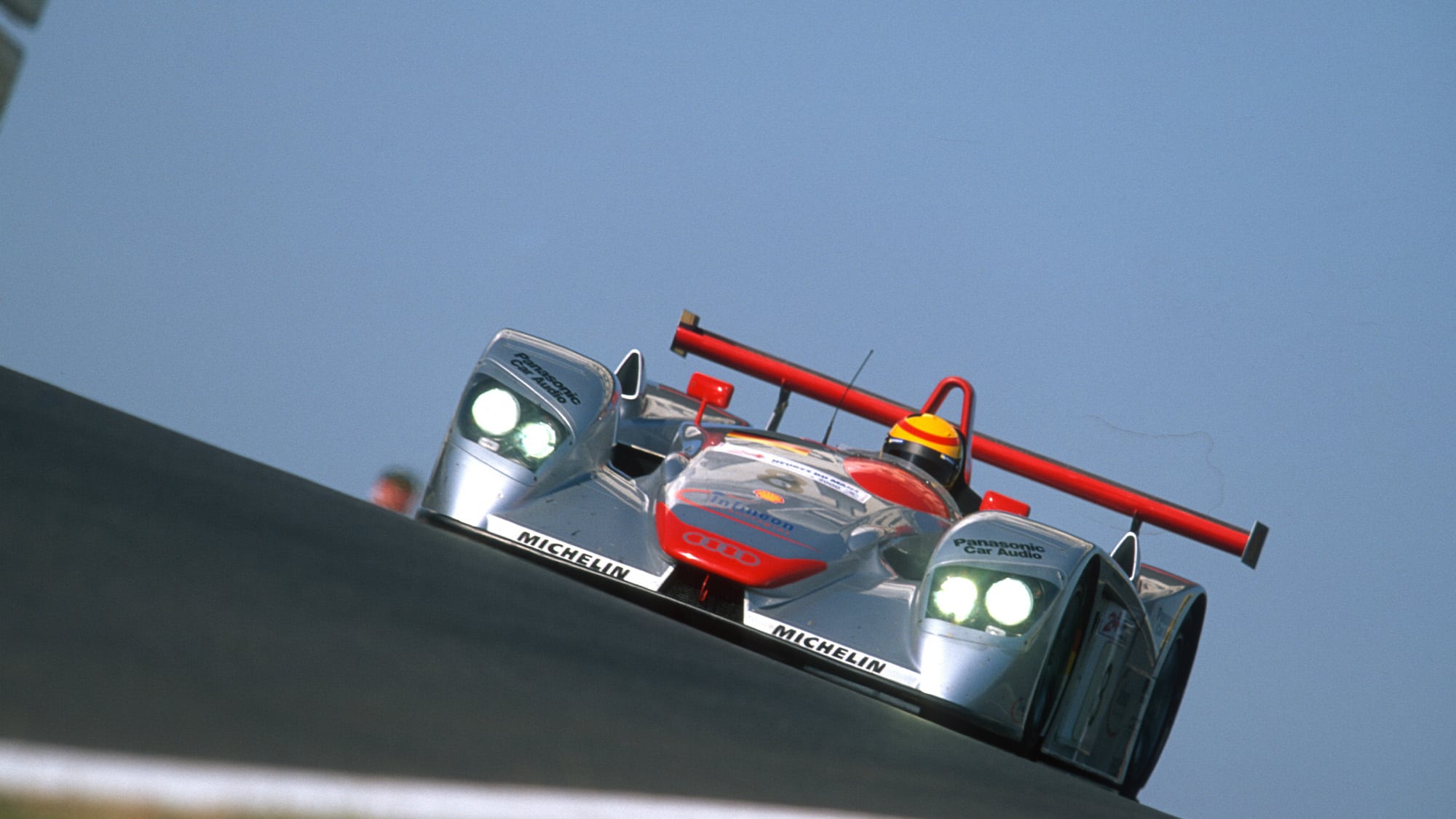
Frank Biela on his way to Audi’s first Le Mans win with the R8 in 2000
Audi
Audi’s most faithful and successful servant has been ultra-competitive in every saloon series he’s contested. Biela’s first scalp was the DTM of 1991 driving a V8 Quattro. But it was in 2-litre Super Touring (Class 2) that he built a fearsome reputation, taking the French Supertourisme and BTCC crowns in 1993 and ’96. In between he scooped the ’95 Touring Car World Cup, beating the cream of the tin-top talent pool. He was second in the ’97 BTCC, racking up 13 wins in his two years in the series.
The only blot on his escutcheon is his doubters’ claim that the Quattro’s 4WD advantage was never adequately counterbalanced by its mandatory weight penalties. — DS
* One of his nine DTM victories was scored for Mercedes, at the Nürburgring in 1990.
* Won 1996 Macau Gula race.
James Allen: A proper driver: he looks the part, always delivers and has now reinvented himself as a sportscar ace. Sheer class.
17. Rickard Rydell
If Alain Menu was the best driver of the BTCC’s Super Touring era, then this quiet Swedish florist (no, really) was its fastest. Rydell brought the same finesse and balance that had led to his success in karting and F3 (why he never got past British F3000 in single-seaters is a mystery) to a variety of TWR-built Volvos, including an Estate (!) between 1994-99. In that time he won 18 BTCC races and took the title in ’98. Volvo then pulled out and Rydell joined Ford for 2000, scoring three more wins in its Mondeo.
When Volvo decided to tackle the revived ETCC in 2002 there was only one man for the job. But after some early promise with a Prodrive-run S60, this programme ran out of steam and Rydell signed for SEAT for 2004. His subsequent win at the penultimate Oschersleben round, the first for the Spanish make, hints that there’s more to come from this 37-year-old. — PF
* Won 1998 Bathurst 1000 in a Volvo S40 co-driven by Jim Richards.
* Recorded 13 pole positions in 1995 BTCC aboard Volvo 850.
Andrew Golby: A gentle personality cloaks the real Rickard Rydell – hugely determined, quietly arrogant. He made the outside-inside pass at Thruxton’s Complex look easy. It’s not.
16. Jack Sears
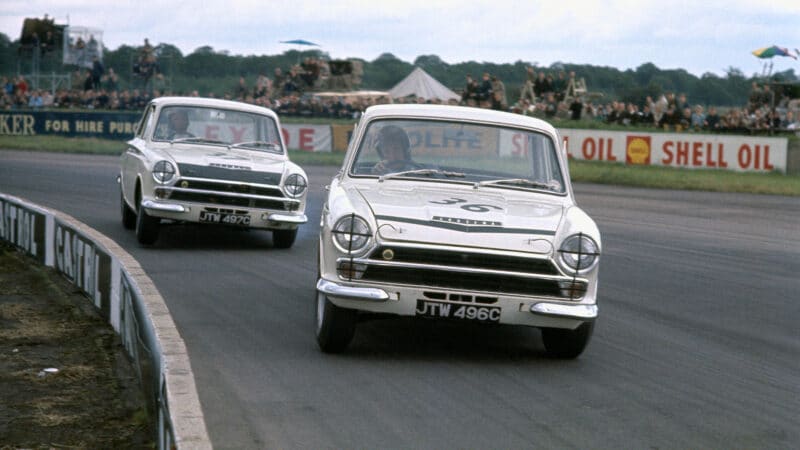
Sears slides his Cortina through Silverstone
Klemantaski Collection/Getty Images
The first BSCC champion,‘Gentleman Jack’ steered an unwieldy Austin A105 Westminster to the crown in 1958. After spells with Jags and Cortinas, it was John Willment Automotive team manager Jeff Uren – himself a BSCC titlist in 1959 – who installed Sears in a Holman & Moody – built Galaxie for the high-profile Daily Express meeting at Silverstone in mid-1963. Everyone laughed at the 17ft leviathan, especially the Jaguar Mk2 pilots. They weren’t so vocal when it won. Rather than face up to the fact that the car was good and that Sears was pretty handy, too, rivals claimed that the car’s roll-cage wasn’t in the spirit of the regs! With much of it removed, the Galaxie still won all seven remaining BSCC rounds to give Sears his second title.
This underrated driver would end his career with 12 BSCC race victories. — RH
* Won 1963 SCCA Marlboro 12 Hours in a Cortina co-driven by Bob Olthoff.
* Jack and David Sears are the only father and son with BTCC wins: David won twice at Donington, 1989 and ’90.
Alan Mann: Jack was fast, reliable and safe but had another gear which only engaged when he lost his rag.
15. Jo Winkelhock
‘Smokin’ Jo arrived arrived in the BTCC in 1993 with three okay DTM seasons – three wins and eight fastest laps – behind him. Nobody really expected him to beat his Schnitzer BMW team-mate Steve Soper to the title – but that’s precisely what he did, scoring the first five of his eventual 12 BTCC race wins.
An out-and-out racer whose nickname stemmed from his late-braking tactics as much as his nicotine habit, he was a tin-top force throughout the 1990s, collecting Germany’s STW Cup in ’95 in controversial circumstances. But he wasn’t just a sprint charger, as his quartet of 24-hour victories at the Nürburgring (1990-91) and Spa (1995 and ’98) proved.
After a decade of success with BMW (including a Le Mans victory in 1999), he switched to Opel for the new-look DTM in 2000. Things started well – two poles, one win, one fastest lap in the first year – but his star waned thereafter until he retired in 2003. — PF
* Scored wins at tracks as diverse as Macau, Nishi-Sendal, Killarney and Wellington’s street circuit.
* Won 1994 Asia-Pacific title.
Jim Holder: Faster than Soper in the BTCC – a good benchmark if this list is anything to go by. Perhaps should have retired a few years earlier but his other stand-out feature, his charisma, kept him in the mix.
14. Hans Stuck Jnr
That the effervescent Stuck would become a racing driver was a given: son of the great pre-war Auto Union pilot Hans, the Austrian was pounding the Nürburgring aged just 14. In 1969, after all of two months’ competitive driving, he finished third there in the 24-hour race, winning the round-the-clock classic outright a year later.
‘Stuckie’ was – and remains – a formidable tin-top pilot. He won the 1972 German saloon title for Ford, scooping that year’s Spa 24 Hours with Jochen Mass too. Even on his graduation to F1, he continued to race saloons, scouring umpteen victories for BMW in the ETCC. After his GP career fizzled out he was awesome in IMSA GTO before returning to the DTM with Audi in 1990 and taking the title with its Quattro. — RH
* Won two more Nürburgring 24 Hours: 1998 (in a BMW 3-series diesel) and 2004.
* Scored 12 wins, 520.5 points, five poles and nine fastest laps in DTM.
David Evans: Nobody made the CSL go faster. I still treasure my July 1974 issue of Motor Sport with Stuckie’s airborne ‘Batmobile’ on its cover.
13. Dieter Quester
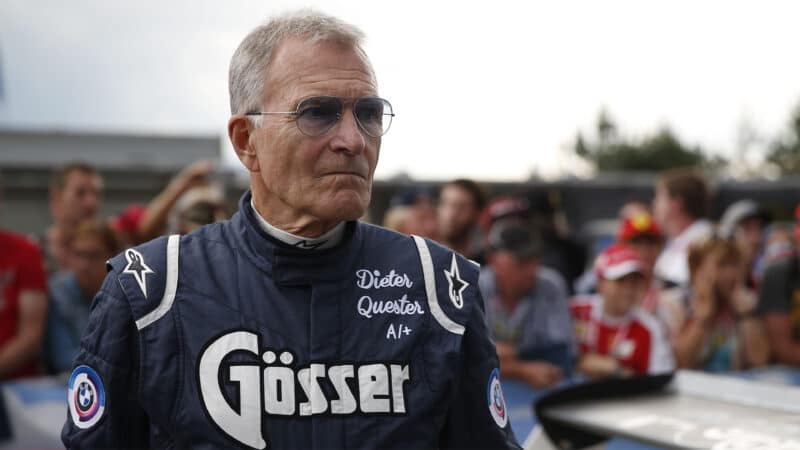
Dieter Quester — “A real hero”
ERWIN SCHERIAU/AFP via Getty Images
Inextricably linked with BMW, this ex-speedboat and motorcycle racer only switched to four wheels late in 1965, by which time he was already in his mid-20s. (That he married Alexander von Falkenhausen’s daughter a year later may have had something to do with his choice of marque). Results were instant: he won the ’66 Austrian touring car championship and followed that up with Division 3 honours in the 1968 ETCC, wrapping up another Euro title within 12 months.
While maintaining an active sideline in sportscars and single-seaters up to F1, Quester managed two more ETCC titles (1977 and ’83) and more than 40 (and counting) 24-hour races. — RH
* Won three Spa 24-hour races; 1973, ’86 and ’88.
* Won 1973 Silverstone TT in a BMW CSL co-driven by Tom Walkinshaw.
Alisdair Suttie: Quester in the Gösser Bier-liveried CSL – a car that looked fat even when stationary – is one of my earliest memories. He’s 65 now and still going strong. A real hero.
12. Laurent Aïello
Is this an oversight? Aïello is probably the most complete touring car driver of the modern era. If he was British maybe he would be higher on our list…
The Frenchman has won every tin-top championship he’s tackled, being the only driver to secure the French (1994 with Peugeot), German (’97, also with Peugeot) and British (’99 with Nissan) Super Touring titles. He scored 10 wins in his one and only year of BTCC.
That was impressive enough. But to then take on the might of Mercedes-Benz and Opel in the DTM, driving an Audi TT that benefited from limited factory support only, and to win the title in style in 2002, was his greatest achievement.
He really has nothing left to prove – except perhaps to this jury. — DS
* Recorded 20 victories during a three-year STW Cup campaign, 1996-98, all with Peugeot.
* Scored 10 wins during a three-year French Supertourisme campaign, four for BMW (1993) and six for Peugeot (1994-95).
Marcus Simmons: He won four ultra-competitive championships with three different makes. Came to Britain for just one year and no-one saw which way he went. Amazing.
11. Klaus Ludwig
Even ignoring his German Supercup titles in Porsche 935s and Zakspeed Capris, his IMSA wins with the Miller-backed Mustangs, his back-to-back Le Mans successes in a Joest Porsche 956 and his nine FIA GT wins (and one title, 1998) for Mercedes, this Bonn-born racer’s ‘roofed’ statistics are still sensational.
He fell a point shy of the world title in his first full saloon year 1987, and racked up seven endurance victories during his two seasons with the Eggenberger Sierra Cosworth squad. This model also brought him the first of his three German touring car titles, in ’88, and the first of five of his 36 wins scored in DTM-type cars over the next 12 years. His best tin-top work was done for Mercedes, however, winning the DTM title for it in 1992 and ’94 – and doing so by handsome margins on both occasions despite this championship’s hard-as-nails racing.
Affable and amiable. Ludwig was a very tough operator capable of pulling a team in, around and behind him. When this was allied to his pace, trackwise smarts and an unerring ability to win just about every time he rocked up at the Nürburgring, i.e. a lot. It’s no wonder that Mercedes loved him – and gnashed its teeth when he scored six DTM/ITC wins for Opel in 1995-96.
After a year away from the big leagues he ‘unretired’ for 2000 and scored his last two DTM victories and finished third in the overall standings – as a 50-something in a resurgent series chock full of young hotshoes. — PF
* Won Nürburgring 24 Hours twice: 1987 in a Ford Sierra Cosworth and ’99 in a, ahem, Dodge Viper.
* Registered 14 poles, 16 fastest laps and 1792.5 points in DTM/ITC.
* Scored 12 DTM/ITC wins at the Nürburgring alone.
Charles Bradley: Because of his Le Mans wins people call him an enduro man. But he cut the mustard in sprints. He was winning in 2000, and gives the impression he could do so today.
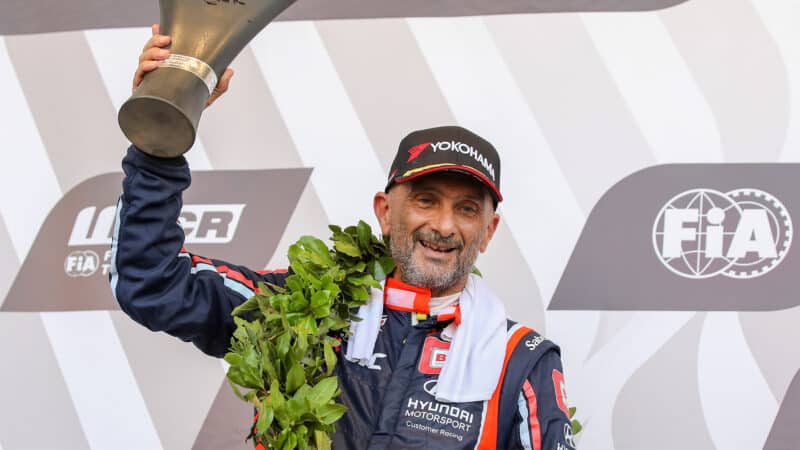
Karting ace turned touring car legend
Bruno Barros / DPI / NurPhoto via Getty Images
With a stellar karting career – National European and World titles – this likeable Italian seemed set for single-seater glory, but clocked up just one point in his 38 GP starts between 1987-95. He was underfunded and underrated. By the time of his F1-closing one-off drive with Tyrrell at the Nürburgring, though, he had met with the success his talent deserved, in saloons.
Surprisingly overlooked by Alfa for its headline DTM campaign against Mercedes, the wisdom of it not putting all its eggs in one basket was proved when Tarquini swiftly established himself as one of the leading proponents of front-wheel-drive Super Touring cars – not the sexiest of racing sobriquets perhaps, but a tricky task that has proved beyond numerous other high-profile pilots. He finished third in the 1993 Italian Super T series with five wins and then took the BTCC by storm scoring eight victories in ’94 to secure the most coveted title of its kind.
His programme then fragmented: campaigns split between countries, second-division 4WD Alfas in the ITC (one win, at Silverstone) and a move to Honda and back to Super Touring in 1997. He scored the occasional victory for the Japanese marque during the next five seasons, but his stock ebbed away: by 2002 a run in an Alfa Giulietta at the Goodwood Revival was his first competitive drive of the season.
But the resurgence of the ETCC in 2003 allowed him to re-establish his credentials winning the title for Alfa in a dramatically close-fought first year and finishing third in 2004.– PF
* As well as securing the BTCC title in 1994, he won a round of Spain’s Superturismo series.
* Scored two wins in 2003 Super Production Championship for Nissan.
* Scored Italian Super T win as early as 1989, for BMW.
Paul Fearnley: Had the best equipment in the 1994-BTCC, but he impressed with his speed, racecraft and out-of-the-car savvy. It’s good to see him back winning again.
9. John Cleland
The joker of the pack, it was always a big mistake to underestimate him. The gags and wind-ups were part of the Scot’s strategy to unsettle his rivals – and it worked. Most of the star turns in the BTCC of the 1990s were single-seater aces who’d only turned their hand to tin-tops after F1 dreams had petered out. In contrast Cleland’s background was the British clubbie scene: rallies, autocross and hillclimbs. His connection with Vauxhall goes back to the early 1980s driving production saloons. But what really sticks in the mind are his antics in a fearsome 5.7-litre V8 Carlton in Thundersaloons.
What a shock to the system it must have been when he switched to the BTCC and a modest fwd 2-litre Astra for 1989. But it was worth it: he won the (class-based) title, the first Scotsman to do so since Jimmy Clark in ’64.
His second BTCC title in 1995 was more impressive. Against a new generation of Super Tourers, Cleland’s ageing Cavalier should have been outclassed. But in its Ray Mallock-built guise, it was more competitive than ever, and its hard-charging driver proved once and for all that, with the right equipment, he could beat anybody in a tin-top. — DS
* Won British Production Car Championship in 1984 and ’85.
* Won British Thundersaloon Championship three times: 1986-88.
* Finished second in 2001 Bathurst 1000 in a Ford Falcon.
Dave Richards: He’s great value: outspoken off the track, aggressive on it – exactly what touring cars needs. His name should be synonymous with Vauxhall as Gerry Marshall’s.
8. Jim Clark
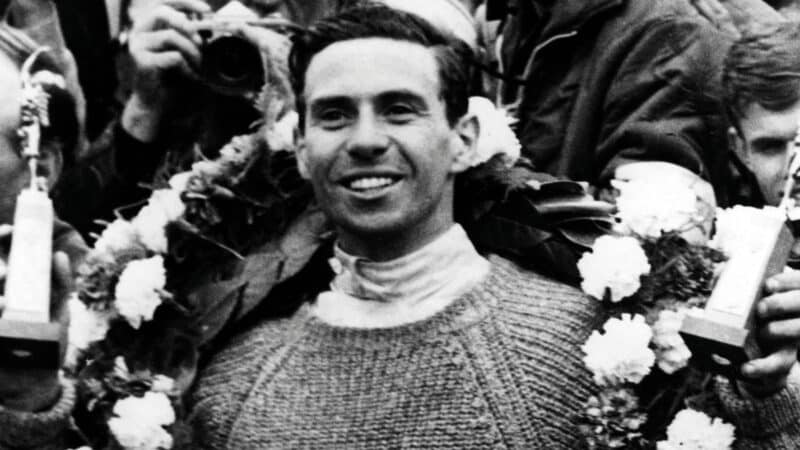
Jimmy Clark was a master in anything with four wheels
Getty Images
Surprised to see the sainted Formula 1 star so high up the list? You really shouldn’t be: the Scot was as adept in a saloon car as he ever was in an open-wheeler. Few motor racing images are as evocative as that of Clark three-wheeling his ‘tina around Brands.
After sporadic outings during 1963, including one class win, the ’64 BSCC title was a whitewash: Clark managed all eight rounds between F1 commitments and mustered a clean sweep of class victories with the works Lotus-Cortina, three of them outright race wins despite the looming presence of the Ford Galaxies.
Though unable to realistically compete for the overall title in later years, Clark still performed the occasional smash-and-grab raid on the Brit tin-top series, managing two outright victories in 1965 (plus three class wins) and three the following year (plus two further class wins). Put simply, there was no one who could live with him in equal equipment, even if the works Cortinas were very, ahem, trick. Add in further successes with the Cortinas, including the 3 Hours of Sebring in ’65 and second in class at the same venue in the 12-Hour race a year earlier, and now can you see why he’s on the list? — RH
* Scored nine BSCC wins, putting him equal with Graham Hill.
Mark Hughes: He was a genius in single-seaters, he was incredibly adaptable – hey presto, instant saloon car hero. It’s as simple as that.
Although he never secured the BSCC outright or any big international events, larger-than-life Marshall was undoubtedly the man to beat in Production Saloons during the 1970s, and was simply peerless in Special Saloons: he took 63 wins in his ‘Old Nail’ Vauxhall Firenza alone. In the glorious Repco V8 ‘Baby Bertha’ he was in a class of his own: in 1976 the duo was only beaten once.
The combo of Marshall and DTV tuning and preparation ace Bill Blydenstein did much to raise the Luton marque’s profile as a serious player at a national level, and their second place overall in the 1977 Spa 24 hours was remarkable considering all they had at their disposal was a Vauxhall Magnum.
It could be argued that Marshall’s extra-curricular activities may have got in the way of him achieving more at a higher level. He probably wouldn’t have wanted it any other way, but it’s a crying shame that he wasn’t seen out in the Rover Vitesse or a Sierra RS500 — RH
* Won 1972 and ’74 Forward Trust Saloon Car Championships (class winner in ’73).
* Won 1974-76-77 Tricentrol SuperSaloon Car Championships.
* Scored five BTCC class wins.
Matt Bishop: Totally sideways but totally in control. Hefty like a Kilburn hod-carrier, he had hands as quick as a Colombian pickpocket’s!
There was a spell, a miraculously long one, when this Venetian (he was born across the water in Mestre actually, but Venice sounds better) couldn’t stop winning – titles that is. Between 1986 and ’93 he secured seven of them, including the only world championship so far up for saloon car grabs. What’s even more remarkable is that he was only favourite for the last three, the Italian Super Ts of 1990-91 and ’93.
His unbroken glory run of championship success – Euro, World, Euro and DTM (the world’s most competitive series by ’89) – was a triumph of sustained speed, innate survival instinct, masterful strategy, slices of good luck and, in ’86 a governing body that was not too hot at maths (the ETCC title was Win Percy’s until a recount was demanded). Ravaglia wasn’t the fastest on BMW’s books but he more than adequately covered all the bases, was perfectly suited to the guileful Schnitzer outfit and never let Munich down. He was its chosen man for several very good reasons, and its not as if there weren’t dozens of wannabes desperate to punt him off his perch.
Touring cars switch to TV-friendly ‘local’ spirit formats gradually found him out – the Super T series was not the worlds’ worst national series but nor was it the strongest – but his win in the 1989 DTM had already proved that he could swap paint with the best, as well as polish his trophies. — RH
* Won Spa 24 hours here times: 1985, ’88 and ’94.
* Won Nürburgring 24 Hours twice: 1989 and ’95.
* Won 1987 Macau Gula race.
Rob Aherne: Its not hard to justify: he was the bloke who won everything. He did it by stealth as much as anything else: the Alain Prost of Touring cars – super-smooth, super-successful.
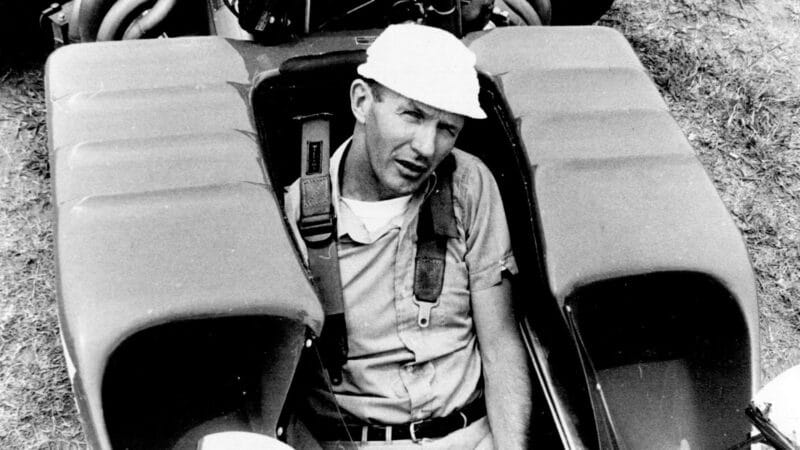
35 outright BSCC/BTCC wins put’s Gardner amongst the greats
Stuart William MacGladrie/Fairfax Media via Getty Images
Where to start? This laconic trawler skipper’s son from Sydney drove Jags with great success in Australia before arriving in Europe. As a mechanic for Aston Martin and Jim Russell, his best years were probably behind him as a potential single-seater star (although he was mighty in Formula 5000 later), so he was happy to take Ford’s coin and concentrate on saloons and sportscars during the mid 1960s. With Alan Mann Racing he comfortably won the ’67 BSCC in the charismatic red-and-gold Ford Falcon repeating the feat a year later with the FVA-powered Lotus-Cortina Mk2 and newly launched Escort Twin-Cam from June: he would win his class in the eight remaining rounds. That same season he gave the Escort its first ETCC outing: at Zolder, despite being 40bhp down on the works Alfas, he was the class of the field and won outright.
After Mann had pulled out of racing to concentrate on his helicopter/aeroplane business, Gardner set up Motor Racing Research in 1970, fielding a glorious Ford Boss Mustang which took eight wins in the BSCC but lost the title to Bill McGovern’s Imp. FG would have to wait until ’73 before sealing his third tin-top crown in the thunderous SCA Road Services Chevrolet Camaro. — RH
* 35 outright BSCC/BTCC wins put his third on all-time list.
* Secured his BTCC class seven times in a row, 1967-73, scoring 44 class wins in total.
* Twice scored five consecutive outright BTCC wins: 1970 and ’73.
Alan Mann: His record speaks for itself but he did need a lot of prodding to give his best. It was always there when needed though.
The successor to Ludwig as ‘King of the DTM’. But in comparison to his predecessor, the German will always be associated with just one manufacturer, Mercedes. Schneider has silver running through his veins. Bernd did make it to Formula 1, but two miserable seasons with Zakspeed and a pair of races for Arrows barely counts. As Michael Schumacher made his starting debut with Jordan, Bernd was coming to terms with life on the F1 scrapheap.
At first he was the pretender, but when Ludwig jumped ship to Opel in 1995 Schneider’s time had come: not only did he win the DTM, he also claimed the inaugural ITC. The death of high-tech, high-cost Class 1 saloon car racing forced Mercedes into GTs. Schneider followed, claiming the FIA title at his first attempt in’97. But after the Merc’s back-flipping debacle at Le Mans in 1999, driver and marque were more than happy to return to tin-tops via a reborn DTM in 2000. In five years he has won the title three more times. He was well beaten in 2004 — sixth place his first time out of the top two overall since 1994 — but he won the finale, and 40 is no great age for tin-top aces.
It’s just a shame that he’ll never race in any other touring car race series — and certainly no other make. — DS
* A record 38 DTM/ITC wins
* Won the 1989 Spa 24-hour race in a Ford Cosworth RS500
David Malsher: A Mercedes icon. The yardstick. The Michael Schumacher of touring cars.
3. Alain Menu
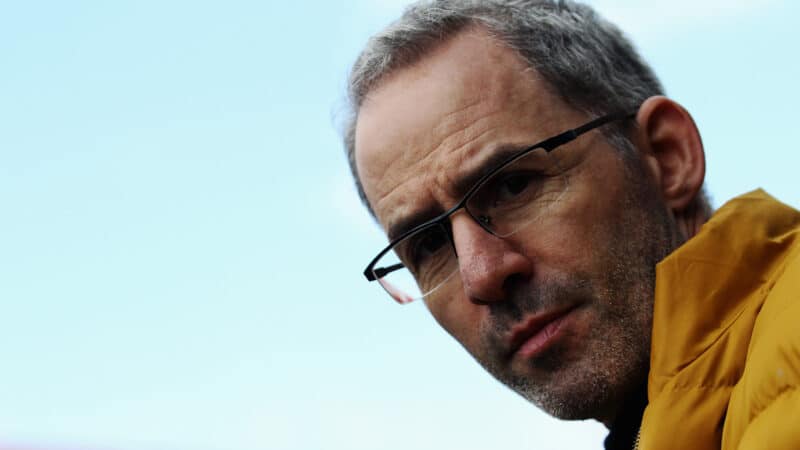
Menu always delivered
Ker Robertson/Getty Images
Probably the best front-wheel drive Super Touring driver of them all? Our judging panel seems to think so — but Aiello must surely run him close.
Menu would probably have made a decent GP driver had the cards fallen differently, but as his single-seater career ground to a halt in Formula 3000, he gambled on switching codes: the move paid off. He began his saloon career with a couple of BMW drives in the 1991 DTM, then joined Prodrive BMW squad for his first BTCC campaign. The following year he joined Renault: an association that would loom large for most of the 1990s.
The first season, with Renault’s recalcitrant 19, reaped just one victory, but Menu had comfortably outgunned reigning champion Tim Harvey. The Laguna was introduced for 1994, and as the BTCC grew in stature, so did Menu. Three years in a row he was its runner-up then finally he got the monkey off his back with a dominant season in ’97. By the time he won his second crown, in 2000 with Ford, the BTCC glory days were over, but he still had to beat ace team-mates Rydell and Anthony Reid.
Three fruitless DTM campaigns followed but his lack of success reflected badly more on Opel than the Swiss.
After a flirtation with GTs, Menu is back in tin-tops for 2005, joining Chevy in the brave new World Touring Car Championship. Can he do a Tarquini? — DS
* Most points and podiums in BTCC’s Super Touring era.
* Most wins in a BTCC season: 12.
* Set two fastest laps in 2003 DTM
Keith Greene: When I set up Renault Dealer Racing I was asked to get the number one plate (Tim Harvey) and who I would recommend as the other driver. I immediately suggested Alain. Renault wasn’t sure but I was…It was clear to me that he was special.
2. Andy Rouse
Quite simply ‘Mr BTCC’. When Rouse retired from driving in 1994 he could look back on a saloon career that spanned over 20 years and included four BTCC titles, nine class titles and 60 outright victories. Series records all. He won in almost everything he drove. He won the Ford Escort Mexico series in 1972 and by ’75 had secured his first BTCC title in a Triumph Dolomite Sprint.
Outside of the BTCC, he partnered Derek Bell in the ill-fated Jaguar XJ12C ETCC assault of 1977, scoring three poles, three fastest laps and the car’s best result: second at the Nürburgring.
But it was in the BTCC where he stamped his mark, as a team owner as well as a driver. Three titles in as many years between 1983 and ’85 showed his class, especially as each was secured in a different car: Rover Vitesse, Alfa Romeo GTV6 and Ford Merkur. He was the benchmark in the Sierra Cosworth years (even if Robb Gravett beat him to the title in 1990), with victory over the works Eggenberger squad in the ’88 Silverstone TT a career highlight.
Rouse then played a leading role in the creation of Super Touring, which enjoyed a global boom during the 1990s. He even adapted successfully to front-wheel drive: the wins kept on coming.
No-one has made a bigger impact on British saloons than this smooth driver and quietly determined engineer.– DS
* Only man to claim four BTCC titles.
* Scored a record 84 BTCC class wins.
* Record-equalling 12 BTCC class victories in one season, 1975.
* Set pole position for very first WTCC race, Monza 1987.
Murray Walker: The ultimate touring car racer. Not just for his unequalled record of success but for his engineering ability, enthusiasm and unfailing consideration and courtesy. A commentator’s dream.
1. Peter Brock
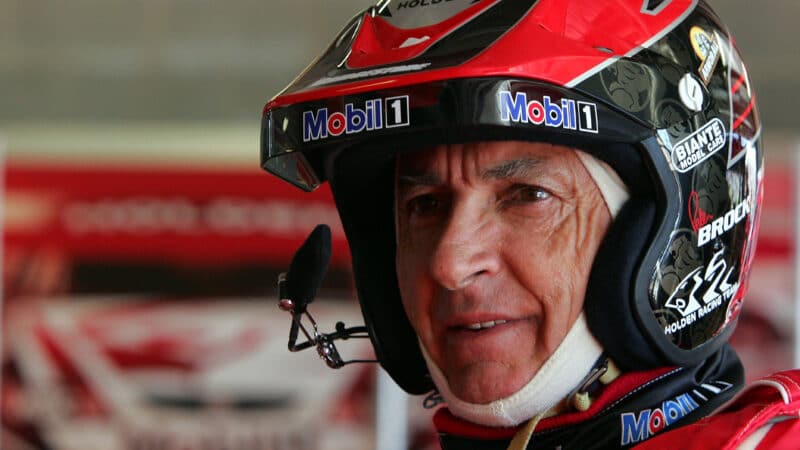
Peter Brock: the best there has ever been
Robert Cianflone/Getty Images
Australian V8s: unsophisticated and uncouth. Holden versus Ford: saloon racing’s most narrow-minded rivalry. What else? Oh yes, burnt-out cars, and shelters constructed from tubes of ‘The Amber Nectar’ atop Bathurst’s Mountain. Yet such is the esteem in which ‘Peter Perfect’ is regarded, he rises above even this Eurocentric-warped view of his Down Under world.
Urbane, intelligent, philosophical and engagingly left field on occasion, Peter Geoffrey Brock also happens to be one of the smoothest, fastest, canniest of all touring cars aces. His three Australian tin-top titles (1974-’78 and ’80) has been topped by six drivers, but in all other respects he dominates this series: 37 wins, 57 poles (an incredible 13 in succession in 1979-80) and over 100 podiums from 209 starts. He won in his first full year (’73) as a cocky 28-year-old and in his last (’97) as a 52-year-old icon. And before you dismiss him as a big fish in a small pond, remember that ranged against him were Jim Richards, Dick Johnson, Colin Bond, Allan Moffat, Larry Perkins and Mark Skaife – all of whom it could be argued, deserved a place on this list.
And this is before we get to Bathurst, unquestionably touring car racing’s most important race. Brock realised its value before anybody else and would gear his whole year towards winning it: an incredible nine victories was the result of his attention to detail, mechanical sympathy and natural speed. He also finished second once and third twice, and had a couple ‘in the bag’ before mechanical failures and/or co-driver errors intervened.
Yes his European visits were rare, but the distances and logistics involved, and strength of his brand (and the scene) at home, made such campaigns unnecessary. Had he offered his services in Europe he would have been snapped up – and been successful. Of that there can be no question.
In a country that measures itself in increments of sporting excellence, Brock is mentioned in the same breath as Bradman and Brabham. No other saloon car driver comes close in the household-name stakes. — PF
* Won 1979 Bathurst enduro by a record six laps – and set fastest lap on the last lap for good measure.
* Part of victorious Holden crew that won 2003 Bathurst 24 Hours.
* Finished second in 1977 Spa 24 Hours in a Vauxhall Magnum 2300 co-driven by Gerry Marshall.
* Won long-distance Sandown saloon car race nine times in 12 years: 1973, ’75-81 and ’84.
* Proved turbo capabilities with a blistering Ford Sierra Cosworth pole at Bathurst in 1989.
Alan Gow: The most naturally gifted driver I’ve ever come across. Quick in anything – saloons, sportscars, single-seaters. He’s won races, rallies – and even in rallycross. He’s also a good bloke with no side to him. He’ll spend hours with fans and they adore him for it. He can be a little bit naïve too, but when he commits to something he does so 100 per cent.
The Jury:
Rob Aherne, James Allen, Matt Bishop, Jeff Bloxham, Charles Bradley, Matt Burt, Stuart Codling, Steve Cooper, Steve Cropley, Simon Daukes, James Elliott, David Evans, Lawrence Foster, Jonathan Gill, Andrew Golby, Alan Gow, Keith Greene, Alan Henry, Richard Heseltine, Mark Hughes, Matt James, Paul Lawrence, John Lilley, David Masher, Alan Mann, Mel Nichols, Jonathan Noble, Martin Nott, Derek Redfern, Dave Richards, James Roberts, Tim Schenken, Tim Scott, Marcus Simmons, Damien Smith, Simon Strang, Alisdair Suttie, Bill Thomas, Adam Towler, Eric Verdon-Roe and Murray Walker.
